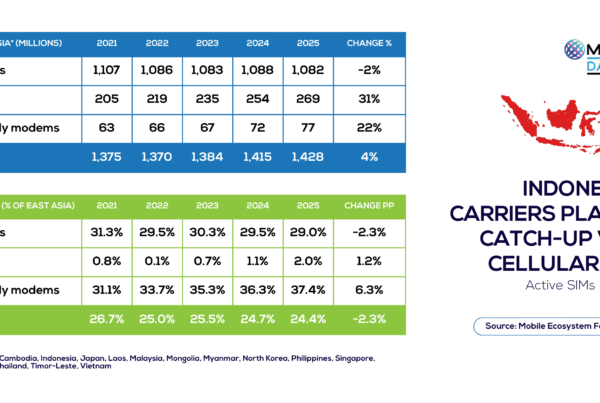Ireland’s telecom regulator ComReg has postponed the next stage of its SMS Sender ID Registry rollout, originally set to block unregistered sender names in October. The delay, linked to technical issues among some providers, extends the current “Likely Scam” warnings. In this post, Stefano Nicoletti, Head of MEF’s Sender ID Registry in the UK examines what the decision means for businesses and consumers.
Ireland’s Communications Regulator, ComReg, has announced a delay in the next phase of its SMS Sender ID Registry rollout, which was originally scheduled to begin blocking unregistered sender IDs from 3 October 2025. A new date has not been set yet. This decision comes amid technical challenges and concerns about consumer risk and industry readiness.
The ComReg SMS Sender ID Registry was introduced to combat the growing threat of smishing and SMS impersonation scams, which have eroded public trust in text messaging as a secure communication channel. Since 3 July 2025, messages from unregistered sender IDs have been flagged as “Likely Scam”, a temporary measure meant to warn consumers while giving businesses time to register their sender names.
On September 11 ComReg reported that 16,784 Sender IDs have been registered by 12,466 organisations, showing relatively strong uptake across sectors. However, now the transition to full blocking has now been postponed.
As the industry transitions to ComReg’s mandatory registry, MEF continues to provide hands-on support to both businesses and aggregators. In light of the recent delay, we’ll be engaging with members of MEF’s voluntary registry in October to explore how we can further assist during this extended transition period.“
ComReg cited ongoing technical issues among a subset of Participating Aggregators (PAs) and Mobile Service Providers (MSPs). While most industry players have resolved their integration challenges, some aggregators still face problems that could result in legitimate messages being incorrectly blocked.
As we reported back in July, the two-step registration process—requiring both registration with ComReg and authorisation via the aggregator—has led to confusion. Some businesses completed only one step, resulting in their messages being flagged as “Likely Scam” despite compliance intentions.
ComReg stated that moving forward without resolving the technical challenges and concerns could pose an avoidable risk to consumers, such as missed medical appointments, banking alerts, or other critical communications. As a result, the regulator has opted to maintain the “Likely Scam” label until all outstanding matters are addressed.
The delay has drawn mixed reactions. While some in the messaging ecosystem appreciate ComReg’s cautious approach, others express concern over the continued vulnerability to scam texts.
At MEF, we supported the Irish registry since its inception, urged aggregators and businesses to accelerate compliance and avoid further disruption.
What Should Businesses Do Now?
If your organisation uses SMS to communicate with customers in Ireland, here’s what you should do:
- Confirm your Sender ID is registered with ComReg.
- Ensure your SMS provider is a Participating Aggregator and has authorised your Sender ID.
- Monitor message delivery and flag any issues with your provider.
- Stay informed via ComReg’s updates and industry briefings
MEF’s Continued Support
Since the launch of its voluntary SMS Sender ID Registry in July 2021, MEF has remained a central player in strengthening Ireland’s messaging security landscape. Over the past four years, MEF has collaborated extensively with the Banking & Payments Federation Ireland (BPFI), the National Cyber Security Centre (NCSC), mobile operators, aggregators, government bodies, and financial institutions.
As the industry transitions to ComReg’s mandatory registry, MEF continues to provide hands-on support to both businesses and aggregators. In light of the recent delay, we’ll be engaging with members of MEF’s voluntary registry in October to explore how we can further assist during this extended transition period.
Meanwhile, MEF remains actively engaged in escalating suspected smishing incidents to mobile operators and aggregators for traceback and resolution. As is often the case during regulatory shifts, fraudsters attempt to exploit gaps and confusion. We’ve seen this pattern emerge in Ireland and are working closely with ecosystem partners to counter these evolving threats.
We remain fully aligned with ComReg’s objective to reduce fraud and are closely monitoring feedback from stakeholders to help refine and strengthen the registry’s implementation.
Looking Ahead
The ComReg SMS Sender ID Registry represents a step forward in Ireland’s efforts to curb SMS-based fraud. With sustained collaboration between the regulator and industry players, we believe the system can mature into a powerful and trusted safeguard against smishing.
The focus must remain on protecting Irish consumers while ensuring the messaging ecosystem remains resilient and effective. To that end, clearer operational guidance, technical assistance, and responsive escalation pathways will be key to the registry’s long-term success.
We encourage all MEF members—both current and former participants in the Irish Sender ID initiative—as well as our aggregator partners, to report any delivery issues or suspicious activity to the MEF Secretariat.






